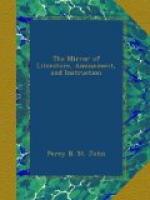LEADER. You may batter and
bore,
You may thunder and roar,
Yet I’ll never give o’er
Till I’m hard at death’s door,
—(This rib’s plaguy sore)—
Semi-chorus With my croak, croak, croak.
Semi-chorus (diminuendo.) With my croak, croak, croak.
Full Chorus (in a dying
cadence.) With my
croak—croak—croak.
(The Frogs disappear)
BACCHUS (looking over the boat’s
edge.)
Spoke, spoke, spoke.
(To Charon.) Pull away, my old friend,
For at last there’s an end
To their croak, croak, croak.
(Bacchus pays his two obols, and is landed)
[1] The comic performances of the
Athenians were usually brought
out at a festival of Bacchus, which lasted
for three days. The
first of these was devoted to the tapping
of their wine-casks;
the second to boundless jollity (Plato specifies
a town, but not
Athens, every single inhabitant of which was
found in a state of
intoxication on one of these festivals,) and
the third to
theatrical exhibitions in the temple of the
patron of the feast.
In this state of excitement it will be easily
imagined that some
coarser ingredients were required by the clever
but licentious
rabble of Athens, to whom these representations
were more
particularly addressed, besides the better
commodities of rich
poetry and wit; and hence the deformities
which have been so much
complained of in the writings of Aristophanes.
* * * * *
NOTES OF A READER.
* * * * *
LAYING A GHOST.
In the Memoirs of J.F. Oberlin, Pastor of a poor Protestant flock, in one of the wildest parts of France, we find the following pleasant recipe for laying a ghost:—
An honest tradesman, relying on the power of his faith, came to him one day, and after a long introduction, informed him, that a ghost, habited in the dress of an ancient knight, frequently presented itself before him, and awakened hopes of a treasure buried in his cellar; he had often, he said, followed it, but had always been so much alarmed by a fearful noise, and a dog which he fancied he saw, that the effort had proved fruitless, and he had returned as he went. This alarm on the one hand, and the hope of acquiring riches on the other, so entirely absorbed his mind, that he could no longer apply to his trade with his former industry, and had, in consequence, lost nearly all his custom. He therefore urgently begged Oberlin would go to his house, and conjure the ghost, for the purpose of either putting him in possession of the treasure, or of discontinuing its visits. Oberlin replied, that he did not trouble himself with the conjuration of ghosts, and endeavoured to weaken the notion of an apparition in the man’s mind,




